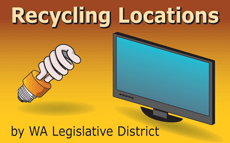The Producer Pays - Wharton School article
An April 2017 article in the Wharton School's online business journal, The Producer Pays, covered extended producer responsibility's (EPR) history and success, in and outside the U.S.
The concept of EPR is that companies that make consumer goods are responsible for managing their products and packaging at their end of life, turning what was formerly waste "into the 'food' for industry and the next generation of products."
"The proper environmental management of the product and its package for their highest and best use becomes part of the costs of doing business, like R&D, marketing, and logistics."
"EPR does not simply shift costs from the public sector to the private sector; it seems to minimize costs through economies of scale, product design and other market forces," according to Connecticut's Materials Management Strategy.
Without a consistent national system, U.S. companies face a patchwork of state and local recycling and producer responsibility laws. According to the director of sustainability at Dow, such a patchwork of state EPR laws is less desirable than "smart federal legislation," because local laws are likely to vary considerably, creating a compliance burden for producers. Just such a concern about meeting the requirements of many different laws led auto manufacturers to agree with the Obama administration on a national vehicle fleet average of 54.5 mpg by 2025; industry has yet to face this in regards to recycling and producer responsibility laws.
Nestlé Waters North America said in support of EPR for packaging, that the EPR model "can better meet the needs of the American marketplace by increasing recycling rates, reducing government spending, and using private-sector efficiencies to reduce the overall cost of recycling."
Upstream's Jamie Rhodes said voluntary programs aren't enough, because they rely on public infrastructure rather than producer responsibility. "There wouldn't be a need for these recycling systems were it not for the products that companies make, and the packaging they chose to use with it."
Professor Robert Giegengack of the University of Pennsylvania is quoted in the article saying that a society "moving toward a sustainable configuration will have to recycle products that today we consider waste, and to keep those products from contaminating other resources on which we depend... If recycling strategies can be built into the industries that today use our key resources, that's a clear example of a pathway to a future that is less unsustainable than the pathway we are on."
